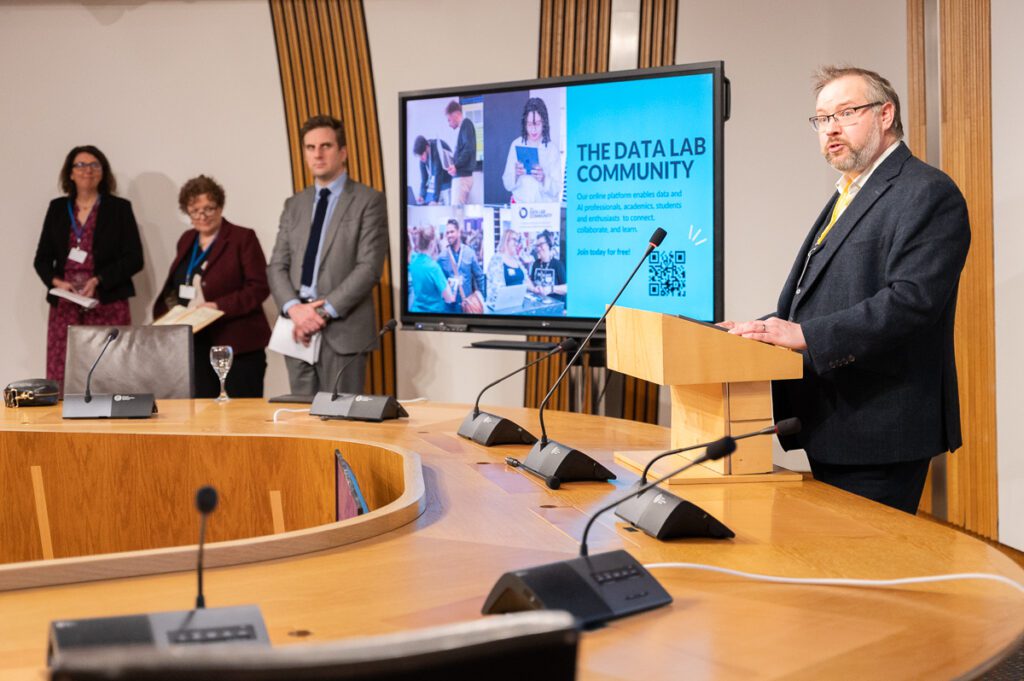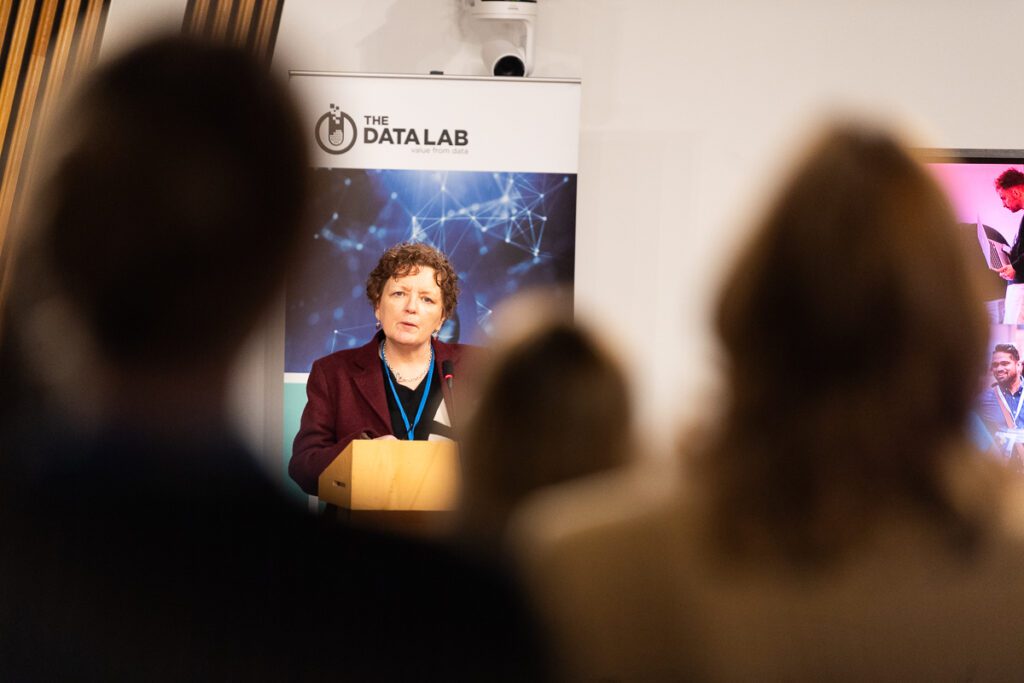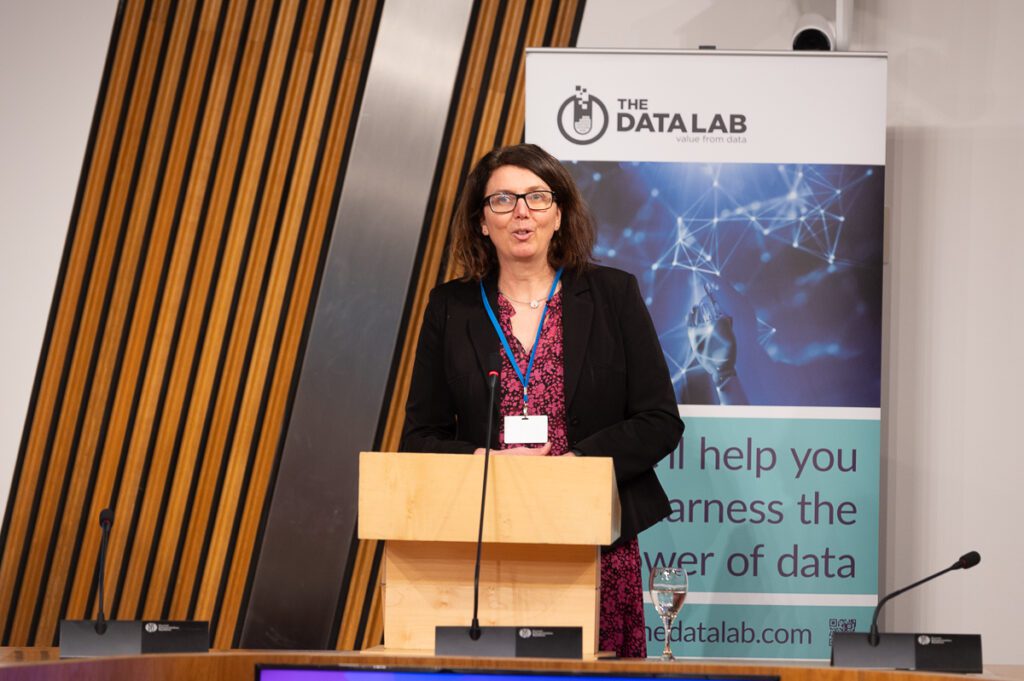
Data and AI are becoming increasingly critical issues. The Data Lab hosted an event at Holyrood to discuss the pivotal role of data and AI in our economy, with insights from industry leaders Liz Whitefield from Hippo and Dr Elizabeth Fairley from Talking Medicines.
The Data Lab’s first-ever parliamentary networking event brought together our industry and social enterprise partners with parliamentarians to highlight the good that data and AI can bring to our society and economy. Daniel Johnson MSP, Edinburgh Southern, Brian Hills from The Data Lab, Liz Whitefield from Hippo Digital and Dr Elizabeth Fairley from Talking Medicines all took to the lectern to deliver speeches on their views of data-driven solutions that could boost our economy whilst increasing fairness and opportunities for all.
Unlocking AI’s potential for our economy and society
Labour’s Daniel Johnson MSP hosted the event and opened the session by talking about the huge potential for data and automation to support workers to do things more efficiently rather than replace them.
Next up, Brian Hills, CEO of The Data Lab, agreed on the positive societal impact that data and AI can achieve but also acknowledged the importance of upskilling to make sure people can adapt to use the tools and tech they need in the face of the rapidly evolving landscape of data and AI.
He commented that people were joking only last year about using ChatGPT to write their speeches, but now it’s actually becoming a reality.

Case studies of AI in practice
Our partner, Liz Whitfield, Executive Director at the Leeds-based consultancy Hippo Digital, took to the lectern to stress the importance of telling more stories about what data and AI can achieve to ensure we grasp opportunities while setting standards.
Whilst businesses are rushing to adopt data and AI into their businesses, she recommends starting with the problem you’re trying to solve and what objectives you want to achieve – not data and certainly not AI.
“Too many times data is an afterthought, but right now it’s front and centre”
Data standards can also have a huge impact. Hippo is supporting NHS England in delivering a new online patient registration service, with the vision of bringing together 100 digital services through the NHS login, making it easy for 50 million patients to access several health and social care services. However, NHS England has 15 million incorrect patient addresses, meaning huge numbers don’t get their letters and invitations to healthcare appointments. But by setting and implementing data standards, they can cleanse the data to resolve this address issue.
Ultimately, data governance is key before we can think about using machine learning and other AI applications to solve problems like modelling service demand.
Liz also mentioned Hippo’s work with GAMSTOP, the UK’s national self-exclusion scheme for gambling websites, as an example of the huge positive impact data and AI can have on people’s lives.
“We need to tell more stories about what data and AI can do – to grasp opportunities, but also set standards”

Adopting GenAI in daily business
Dr Elizabeth Fairley, Co-founder, Chief Operating and Data Officer of Talking Medicines also shared examples of real-life applications of data and AI. Bringing the international perspective to the table as a company operating in Glasgow, London and New York, she talked about the work of Talking Medicines. They look at the patient experience of new drugs, working closely with regulators to understand patient engagement and how to adapt messaging to consumers.
To better understand the patient dialogue on their healthcare experiences, they expanded their data sources to look at social media conversations, including Reddit, which contains vast amounts of completely unstructured data. This more candid perspective shared on social media is a great complement to the data captured in a clinical setting.
Talking Medicines use machine learning to classify data and symptoms patients were experiencing, and by creating their own ChatGPT – called DrugGPT – they have been able to sort and structure the data to extract intelligence.
“We were keen to capture the non-clinical conversational aspect”

However, getting to this stage, building a model to provide actionable insights, is no mean feat and takes years to develop.
Elizabeth acknowledged the importance of keeping a human touch on data, and that while AI technologies have certainly sped up processes, it’s important to keep humans involved in checking data quality and ensuring ethical processing.
The speeches sparked hopeful discussions about what data and AI can achieve for the rest of the networking event. It was exciting to hear a positive slant on the AI debate and see how businesses are already adopting AI ethically to make a positive difference in our society, leaving a tangible taste of just how much more is yet to come.


Leave a Reply